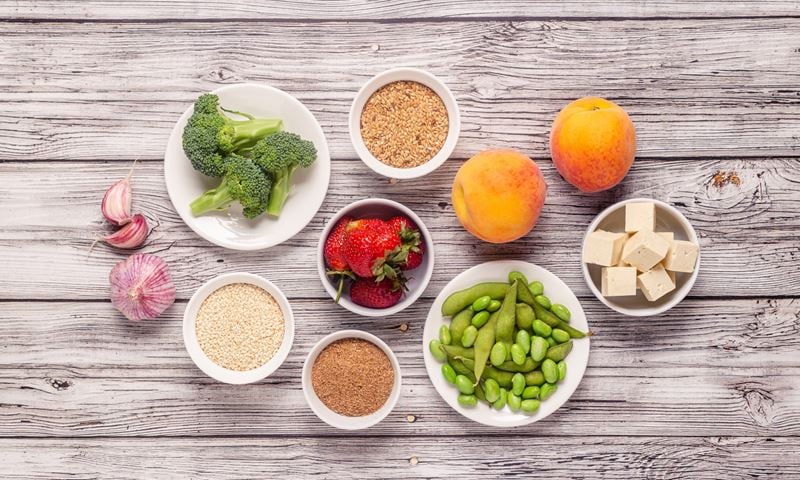Published 05 Aug 2024
Menopause is a part of life for around half of the world’s population, marked by hormonal changes that will affect people differently and cause varying symptoms and experiences. In this podcast, nutritionist Mel Bald discusses the physiological changes and the role that the food we eat can play in supporting the body through this period of transition.
Listen to the 30 minute podcast here.
What are the hormonal changes that occur during menopause and how can they affect a person’s overall health and wellbeing?
There are several different stages of the menopausal transition, which is that time in a person’s life before their final menstrual period.
Perimenopause is the time leading up to the final menstrual period which usually happens in a person’s forties.
Menopause is defined as when there has been no menstrual period for 12 months. The average age for menopause is 51 years, however it’s normal for this to occur anywhere between 45-55 years.
The three main hormones that change in menopause are oestrogen, progesterone and testosterone.
Oestrogen helps to build muscle and bone and has a protective effect on the brain and the heart. As the final period approaches, oestrogen levels can drop by 90%.
Progesterone helps to thin the uterine lining, calms the brain, builds bone and reduces inflammation. Progesterone levels also decrease as menopause approaches.
Testosterone is important for bone and muscle strength and influences a person’s sexual desire. This also gradually decreases with age.
These hormonal imbalances can increase the risk of certain health conditions such as cardiovascular disease and osteoporosis.
It might sound like a bit of doom and gloom, since all these hormones play an important role in our health, however it is a natural stage in a person's life – something that many people go through. It’s important to note that the symptoms and severity can vary widely among individuals.
The good news is that proper nutrition and lifestyle choices can help support the hormonal balance at this life stage and manage the symptoms effectively.
How does nutrition play a role in managing hormonal imbalances and symptoms associated with menopause?
Like with all stages of life, nutrition in menopause plays an important role.
It can help to offset some of the changes that happen as the oestrogen, progesterone and testosterone hormones decrease. What we eat can help to manage blood glucose levels and reduce the risk of developing insulin resistance, which tends to become harder to manage as the oestrogen drops.
Some of the symptoms that people experience in perimenopause like brain fog or hot flushes can continue into menopause, and food has also been shown to help with these symptoms.
Cholesterol levels tend to increase with the change in hormones, and again the food we are consuming can help to lower these.
And then generally, what we’re eating also helps us to look after bone health, preventing metabolic, and cardiovascular diseases, to improve the quality of life, and also our longevity of life.
What sort of dietary pattern should menopausal people be following?
It’s a similar recommendation to any stage of life – the more unprocessed whole foods the better, a diet rich in fruit and vegetables, lean quality protein, good quality fats, and low in refined sugar.
Specific foods that menopausal people can focus on incorporating into their diet include:
- cruciferous vegetables (brassicas) including broccoli, cauliflower, cabbage, kale, rocket, bok choy and brussels sprouts. These contain ‘indole-3-carbinol’ a compound that supports oestrogen metabolism and detoxification to ultimately support our hormone balance.
The other benefit with these veggies is they have been associated with a lower risk of cardiovascular disease and have positive benefits for breast health. Ideally aim to have this family of vegetables daily to get the benefits. - phytoestrogen-rich foods including whole soy foods like tempeh, tofu, miso, whole soy bean milk and edamame. Also grains like oats, quinoa, barley. Flaxseeds, sesame seeds, sunflower seeds and legumes like chickpeas, lentils, red kidney beans and mung beans.
Phytoestrogens are a plant-based oestrogen that has a similar chemical structure to our own natural oestrogen. As our own oestrogen levels fall, they can be helpful to combat the severity of some of the common symptoms like hot flushes, and night sweats. However, only 1 in 3 people have the gut bacteria to process the phytoestrogens, so not everyone will see the benefits. - polyunsaturated fats found in oily fish like salmon, sardines, mackerel, tuna are the best absorbed sources, and then there are plant sources like flaxseeds, chia seeds, hemp seeds, and walnuts, as well as monounsaturated fats found in avocado, extra virgin olive oil, olives, almonds and cashews.
Having these fats (particularly the omega 3s) helps us to absorb fat-soluble vitamins (like vitamin D and K which are essential to bone health), support cognition and also produce our hormones.
The other bonus is they also help us stay full for longer which is important when managing weight. They are known for their anti-inflammatory properties so can be great for joint pain, and for maintaining our cardiovascular health including reducing cholesterol. - calcium-rich foods including dairy such as yoghurt, milk, cheese etc. and non-dairy foods like fortified plant-based milks, tofu, sardines, dark leafy greens (like kale, spinach, silverbeet and bok choy), chia seeds, almonds, sesame seeds (or tahini which is made out of sesame seeds) and cannellini beans.
The hormonal changes we experience in menopause can accelerate bone loss. As we age it can become more difficult to digest dairy foods as our lactase enzyme starts to decrease – this is the one that breaks down dairy foods. You can still get plenty of calcium through non-dairy foods. - Protein – try boosting meals with some eggs, lean meat or chickpeas.
We know that protein is important for so many functions in the body, including muscle and bone health, repair of every cell in the body, and to regulate our immune system. So of course, it’s important at every age, however studies are now suggesting that as we head into menopause and the low oestrogen causes a loss in bone density and muscle mass, we need a little more protein. The other bonus with protein is that it helps to keep us full for longer, and as our calorie requirements decrease with age, this can also help with weight management. - High fibre, low glycaemic index carbs can help to keep our blood sugar balanced – opt for brown, red or black rice instead of white, or protein-rich quinoa!
Are there any foods or dietary habits that people should avoid during menopause to minimise hormonal disruptions or alleviate symptoms?
There are some foods that can trigger menopausal symptoms in some people.
- Hot spicy foods like hot peppers, jalapenos and cayenne, can trigger hot flushes in some because they can dilate the blood vessels, so swapping these to milder spices can be helpful.
- Caffeine can increase the risk of hot flushes, impact sleep quality or make anxiety worse in menopause, so consider swapping to herbal tea or green tea which has less caffeine.
- Alcohol can also aggravate hot flushes and impact sleep quality. Cutting back alcohol can improve sleep, reduce the menopausal symptoms that may have flared, as well as reduce bladder problems which can be exacerbated in menopause.
Weight management is often a topic of concern for many people during menopause due to the hormonal changes that can affect body composition. What is the impact of weight on hormonal balance during menopause and how can nutrition choices support healthy weight management during this phase?
Yes, it’s probably one of the main concerns people come to me with. The hormone changes that occur during this stage can contribute to weight gain, particularly around the tummy area, and for many it can be really hard to shift. Remember that healthy weight management during menopause is not so much about appearance, but also about supporting overall health and well-being. Excess weight can further disrupt hormonal balance and increase the risk of health conditions such as cardiovascular disease and diabetes, so it is important to consider with a balanced and sustainable approach rather than focusing on strict diets or quick fixes.
- Focus on eating a balanced diet with a variety of nutrient-dense foods.
- Make mealtimes easier by having things on hand like frozen vegetables, canned foods and planning the meals to take the pressure off when it comes time to cook.
- Be mindful of portion sizes to avoid overeating.
- Practicing mindful eating is a huge one and can have a big impact. It’s common to eat due to our emotions or have lunch on the run while we’re doing another task. Simply slowing down while eating, savoring each bite, and taking the time to listen to your body's signals of hunger and fullness will make a big difference.
- Staying hydrated is also important. Sometimes, thirst can be mistaken for hunger, leading to unnecessary snacking, so staying hydrated can help prevent overeating and support overall health.
Where can we find further information?
- Jean Hailes is an Australian not-for-profit organisation dedicated to improving women's health across every life stage. They have some fantastic articles and recipes.
- Australian Menopause Society has some great fact sheets, videos, and self-assessment tools.
- Better Health Channel is always a good place for general health information.
If you would like personalised help with your diet or are interested in finding out more about how nutrition can help you during this time of transition, you can make an appointment with a dietitian or university qualified nutritionist.
The Australian government also offers a '45-49-year-old health check' which is covered by Medicare*. This is a once-only check with your doctor for those at risk of developing a chronic disease (this considers those with poor nutrition or who are not getting enough physical activity, any family history or excess weight to be at risk).
*Speak with your doctor for more information.
Find more advice from Mel Bald on healthy eating and recipes to try.
You can listen to this podcast in full and explore others in the Healthier Together series.



